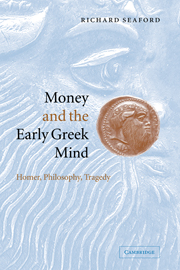Book contents
- Frontmatter
- Contents
- Preface
- List of abbreviations
- 1 Introduction
- PART ONE THE GENESIS OF COINED MONEY
- 2 Homeric Transactions
- 3 Sacrifice and distribution
- 4 Greece and the ancient Near East
- 5 Greek money
- 6 The preconditions of coinage
- 7 The earliest coinage
- 8 The features of money
- PART TWO THE MAKING OF METAPHYSICS
- References
- Index
4 - Greece and the ancient Near East
Published online by Cambridge University Press: 22 September 2009
- Frontmatter
- Contents
- Preface
- List of abbreviations
- 1 Introduction
- PART ONE THE GENESIS OF COINED MONEY
- 2 Homeric Transactions
- 3 Sacrifice and distribution
- 4 Greece and the ancient Near East
- 5 Greek money
- 6 The preconditions of coinage
- 7 The earliest coinage
- 8 The features of money
- PART TWO THE MAKING OF METAPHYSICS
- References
- Index
Summary
ECONOMIES OF THE ANCIENT NEAR EAST
I will now draw a brief contrast between Homer and the two most famous epics from ancient Mesopotamia. This is in order to qualify the recent success in discovering similarities between Homeric poetry and its Mesopotamian predecessors, and thereby to bring out the distinctiveness of Homer and of the world he describes – the distinctiveness of a society that is soon to create the unprecedented phenomenon of pervasive monetisation. For this purpose I first provide a very brief and so inevitably crude characterisation of the Mesopotamian economies, which will narrow to a focus on the important distinction between the social functions of the offering of food to deity in Mesopotamia (4c) and in Greece. By bringing out the early role of money in the Greek provision of sacrificial victims (4d), this will also contribute to the case, set out in chapter six, for regarding animal sacrifice as an important factor in the genesis of coinage.
One way into the bewildering mass of evidence for the economies of Mesopotamia (and of the whole ancient Near East) is to think of the allocation of goods and services as belonging, in principle, to the three categories that we used in our discussion of Homer (2a): reciprocity, trade, and redistribution. A transaction may exhibit one of these forms, or combine elements from two or all of them: in particular, reciprocity and trade are sometimes difficult to distinguish.
- Type
- Chapter
- Information
- Money and the Early Greek MindHomer, Philosophy, Tragedy, pp. 68 - 87Publisher: Cambridge University PressPrint publication year: 2004



